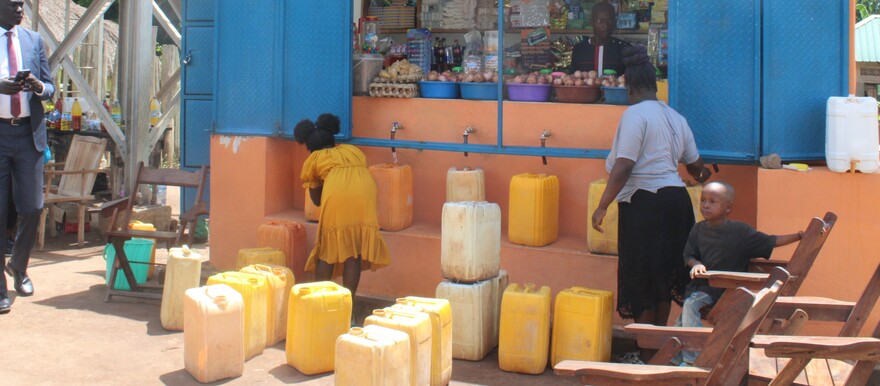Yambio town, previously plagued by the arduous task of fetching water from congested borehole water points, has experienced a remarkable transformation with the inauguration of solar-powered water taps.
This life-changing initiative, funded by the UN Children’s Education Fund (UNICEF) and the government of Western Equatoria State, has brought hope to hundreds of families in the town.
Afare John, a 28-year-old mother of five, spoke with Radio Tamazuj and expressed her gratitude for this significant development. She recounted the challenges she and her neighbors faced when they used to rely on a single borehole for water.
“We were suffering to get water in our area because we have few boreholes and sometimes people would fight over water,” she narrates. “There were long queues most of the time due to a big number of people looking for water.”
The comprehensive water supply system consists of five boreholes, 31 community water kiosks, and a 40-kilometer pipeline stretching across the town. This urban water project, with a total storage capacity of 250,000 liters, was set up by UNICEF with funding from the government of Germany. It has positively impacted the lives of more than 45,000 residents in Yambio County.
Previously, only 36 percent of the population had access to the limited-capacity water system, while others relied on seasonal streams and unsafe hand pumps. The expansion now serves 83 percent of the town’s total population.
The project was implemented by Tekivision General Trading Company Limited which commenced construction on 11 December 2021 and was completed on 31 May 2023, for USD 1.8 million.
One of the notable advantages of this project is the reduction in the use of diesel generators, leading to lower utility charges for the community.
“This water point has helped us a lot, reduced congestion and unnecessary fights over water and we appeal to UNICEF to expand water supply to other areas,” a joyous Afere said.
The impact of the solar-powered water system is also evident in the kiosk management sector.
Boyi Samuel, the manager of one of the water kiosks, highlighted the positive change and said the residents are happy and he is also earning some money.
“I am the manager of this water (kiosk). I sell four jerry cans at SSP 100 and this water is helping the residents of this area so much. They are very happy that the water is sold at a cheap price,” he says. “Before the installation of the solar-powered water points, residents struggled to access clean water and it was often sold at high prices.”
“Those water distributors were selling one jerry can at SSP 150,” Samuel reminisces.
The water kiosk attendant now earns about SSP 30,000 daily from Yambio Town Urban Water and Sanitation Company, which operates the urban water facility.
Until very recently, the community in Yambio consumed water directly from untreated boreholes which led to waterborne diseases like diarrhea and dysentery. These diseases were common causes of death among children.
Luis Peter, another water seller at one of the kiosks, shared how the new water facility has transformed his life, allowing him to earn about 2,000 to 3,000 SSP daily.
“I sell one jerry can at SSP 25 and four jerry cans at SSP 100. Sometimes I can get SSP 4,000 or 3,000 per day,” he explains. “When I sell water worth SSP 5,000, the Yambio Town Urban Water and Sanitation Company takes 3,000 and gives me SSP 2,000.”
Peter emphasized the positive impact of the new water system on health.
“What I like about this water is that it is very clean and safe,” he says. “I used to get sick of typhoid and malaria whenever I drank from a borehole but after drinking this water, I no longer fall sick.”
The benefits of the urban water facility extend to schools and hospitals. Mbiko Samuel, the deputy headteacher of St. Mary Primary School in Yambio Town, emphasized how clean water is benefiting approximately 1,513 pupils.
“In this kind of situation where we have one borehole, it is so challenging but with the connection of this water point, we are going to supply water in all water tanks so that the learners can also get access to water,” Samuel reveals.
Meanwhile, Inipaivura Daniel David, a 17-year-old pupil of St. Mary Primary School, expressed joy at the improved access to clean water.
“We have been suffering for some few years due to a lack of water in our school and I am very happy to have water in our school,” he beams.
The solar-powered water project has not only eased the daily struggles of residents but also improved the health and well-being of the entire community, offering hope and a brighter future for Yambio.




